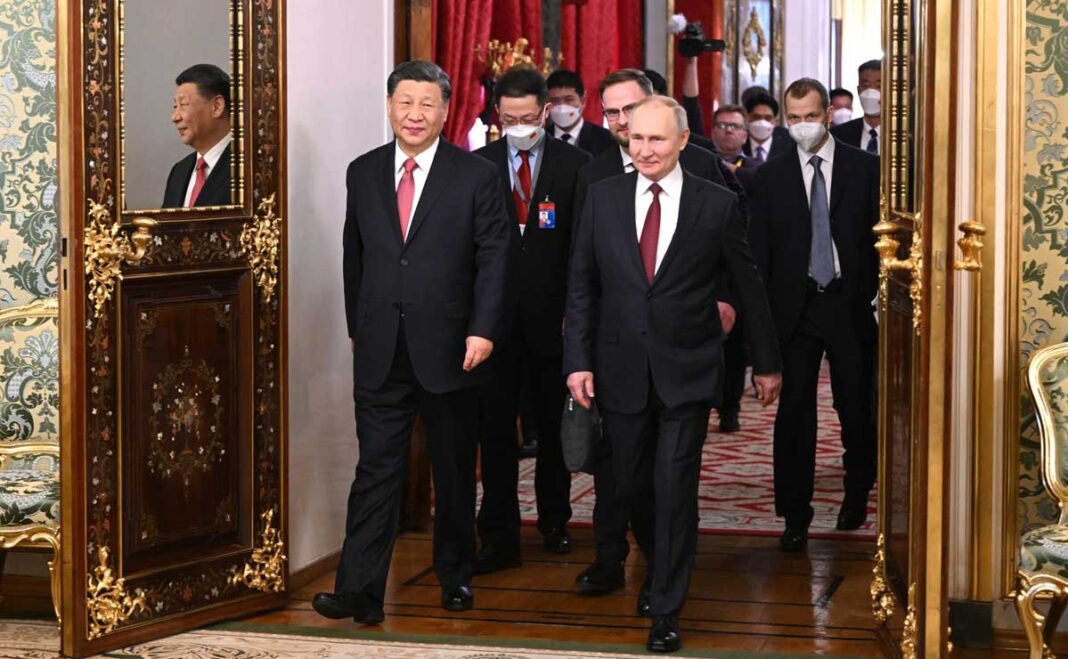Authors: Mariyam Shajil and Dr. Karamala Areesh Kumar*
China, Russia and North Korea (DPRK) have several common characteristics that contribute to the possibility of a trilateral partnership of the three countries in the contemporary world order. The three countries are united in their ambitions for state sovereignty as well as their opposition to US hegemony and have chosen to support each other’s strategic interests. The potential of such an alliance poses a significant threat to the USA’s global dominance as Russia, the biggest of the three countries seeks to counter NATO’s expansion, particularly in Eastern Europe.
The annexation of Crimea in 2014 as well as Russia’s invasion of Ukraine in 2022 reflects the country’s aggressive stance against the USA’s influence. While Russia’s initiation of the Russia-Ukraine war was met with widespread international condemnation, both China and North Korea offered their support to the country. Yet what seems like a unified trilateral axis between the three countries is a set of bilateral relations established due to the reason that it is mutually beneficial for each of them. Putin seeks to conquer Ukraine and ‘restore the Soviet glory and in response, China agreed to help mitigate the effects of international punitive sanctions imposed by the west. Moreover, the two share a strategic ‘no limits’ partnership that was established in February 2022 as a response to their shared opposition to Western influence.
A year into the war, bilateral trade between Russia and China soared to 240 billion dollars in 2023. On the other hand, it has been focusing on fostering relations with North Korea by receiving military aid from the latter. Earlier this week, Putin met with Kim Jong Un to sign a mutual defence pact and it is said to include the mutual defence character calling each other to provide military assistance should the other be attacked. Amid everything, tensions seem to be simmering between China and North Korea even though their historical ties go way back. The deepening of ties between Russia and DPRK has caused uncertainty for China in light of recent developments. In response to the joint statement made by China, South Korea and Japan regarding denuclearisation of the Korean Peninsula, a rare rebuke against its economic lifeline (China is DPRK’s largest trading partner).
During the COVID-19 pandemic, closed off its borders on all sides and halted trade, even to China. Thus, China-DPRK relations play an important role in determining the future of the Russia-China-North Korea axis. Yet despite the tense nature of these relations, the three countries do share common goals at the end of the day. Each of their goals is imperialistic – Russia seeking to conquer Ukraine and assert its influence in Eastern Europe, China seeking to achieve regional as well as global dominance and North Korea, the unification of the Korean peninsula under North Korean control, and additionally their shared opposition against USA’s influence, particularly that of NATO’s in more than one region i.e. the Indo-Pacific as well as the Euro-Atlantic regions. proves that an alliance between the three presents a significant challenge to Western influence as well as to regional stability. North Korea has been focusing largely on its nuclear munitions and an alliance with two nuclear powers presents a huge threat to regional stability. As a result, the USA has focused on fostering relations with its two biggest allies in the Indo-Pacific region i.e. Japan and South Korea. It aims to deter North Korean nuclear aggression and to counter China’s rising military and economic influence in the Indo-Pacific region.
So far, a trilateral alliance between the US, South Korea and Japan has been more successful, the Camp Davids Summit, held in August 2023 is a significant step towards strong trilateral cooperation. It marked a successful milestone in this trilateral relationship as it led to the creation of an annual plan of combined military exercises near the Korean Peninsula. Thus, the potential alliance between Russia, China and DPRK is a multifaceted issue influenced by the strategic interests of each of the country’s military and nuclear capabilities, economic coercion and the historical ties between each of them.
*Dr. Karamala Areesh Kumar, Head, Department of International Relations, Peace and Public Policy (IRP and PP), St Joseph’s University Bengaluru 560027, India
